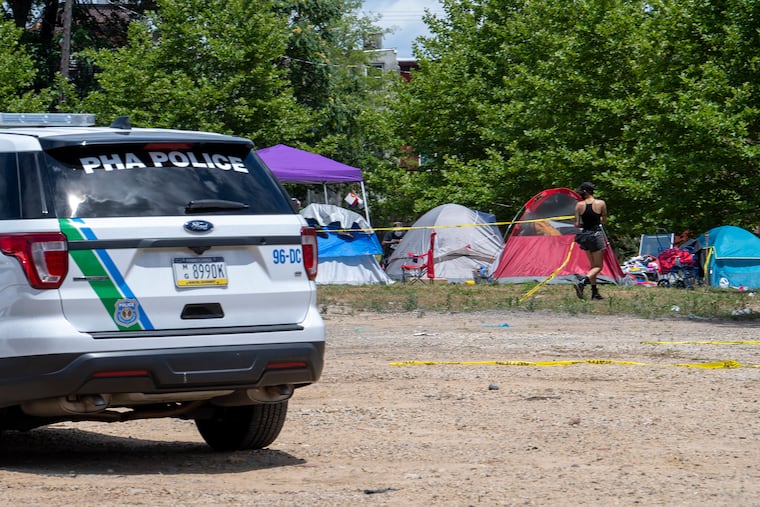Philadelphia Housing Authority is failing unhoused city residents | Opinion
Rather than threatening organizers and disbanding encampments, PHA should focus on keeping low-income and homeless Philadelphians safe.

On a sandy lot at Ridge Avenue and Jefferson Street, just across from the glass-and-steel gleam of the Philadelphia Housing Authority’s new $45 million headquarters, a smattering of tents sit in defiance, strung up with adamant signs. “PHA is a SLUMLORD,” one reads.
Their occupants, both activists and the homeless, have spent months in an increasingly contentious series of protests against the authority, which serves as the landlord for about 80,000 people in Philadelphia. This summer, it could tack on a few extra families to that figure: Some activists, protesting under the moniker Occupy PHA, had begun moving homeless families directly into unused public housing units that had sat vacant for years. By mid-July, 11 families, or about 40 people, were living in vacant, PHA-owned housing. (PHA also posted notices this week telling people to immediately vacate the Jefferson and Ridge encampment.)
» READ MORE: Encampment outside Philadelphia Housing Authority headquarters also given notice to vacate by Friday
PHA’s aggressive, short-sighted response –– to threaten the organizers with legal action, and intimidate protesters off the property with its private police force –– has crystallized what those facing housing instability have said for years. Neither it, nor Philly lawmakers, have a sound plan for helping low-income or homeless residents find safe housing, or for keeping Black and brown residents in the neighborhoods they’ve long called home.
In other words, chasing people away won’t get them a place to live.
The PHA’s efforts to disband encampments and, in some cases, execute evictions, comes as two populations face greater housing instability: renters and the homeless. The best available data indicates that, as over 135,000 people in Philadelphia lost their jobs, nearly 5,000 renters could face eviction.
“Shelters were full, and families had nowhere to go,” says 34-year old Jennifer Bennetch, a longtime critic of the authority and the founder of Occupy PHA, who spent five months last year living in a tent outside its headquarters in protest of the agency. Bennetch says PHA’s general counsel issued two cease-and-desist letters against her for placing families in PHA housing, claiming that she was engaging in criminal trespassing. “I’m not sure what else [PHA] would have them do.”
Occupy PHA’s subsequent demonstrations with the Workers Revolutionary Collective and the Black and Brown Workers Cooperative –– over what housing advocates call the PHA’s “cowboy cop” culture and the brutality of its police force, its use of eminent domain to gobble up and develop hundreds of parcels of private land, and its perpetration of illegal evictions –– is emblematic of decades’ worth of pain from the Black and brown communities that have seen generations’ worth of families displaced.
» READ MORE: Homeless encampment on Parkway ties Black Lives Matter to housing | Editorial
Instead of threatening to sue organizers for desperate attempts to find housing for people who would otherwise be literally homeless –– and in all likelihood living in one of the encampments officials are actively trying to disband –– the PHA should work with Philadelphia lawmakers to keep vulnerable populations safe and socially distanced. That should include the temporary use of otherwise vacant hotels or vacant dorm rooms to house the homeless, not to mention vacant luxury apartments taking up valuable space downtown.
PHA also has plans to use grant money allocated by the city to rehabilitate 25 units of its vacant or blighted housing for the homeless. (As of 2017, there were at least 986 units of vacant or “uninhabitable” units; a spokesperson for PHA did not respond to The Inquirer’s request for an updated count.) This program should be expanded, immediately and without hesitation. In the meantime, PHA should also suspend evictions at least one year beyond Pennsylvania’s eviction moratorium that will go until Aug. 31.
After effectively criminalizing homelessness and disconnecting families from critical social interventions, housing officials shouldn’t be surprised when residents take it upon themselves to find a place to live. Squatting in vacant public housing isn’t an organizing failure –– it’s a sign that PHA, and local lawmakers, have failed to protect some of Philadelphia’s most vulnerable.
Morgan Baskin is a D.C.-based reporter. She writes about housing, homelessness, and social services. @mhbaskin
The Philadelphia Inquirer is one of more than 20 news organizations producing Broke in Philly, a collaborative reporting project on solutions to poverty and the city’s push toward economic justice. See all of our reporting at brokeinphilly.org.